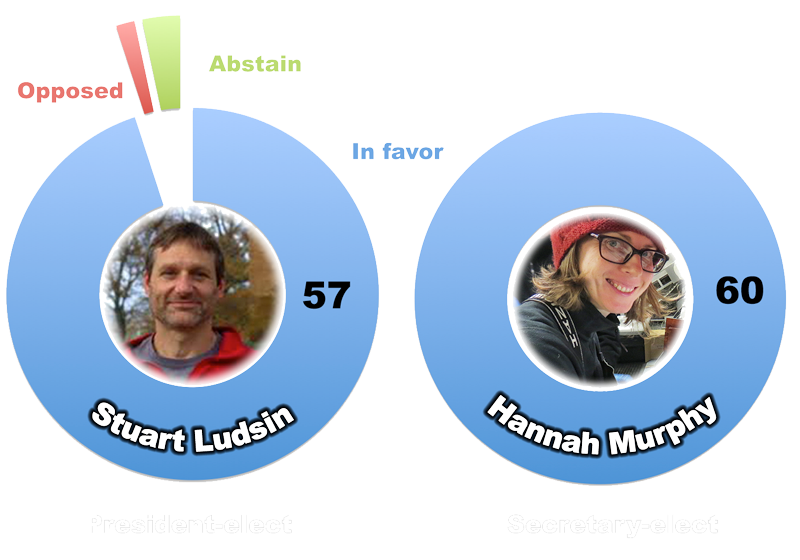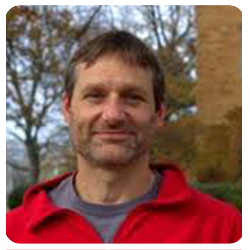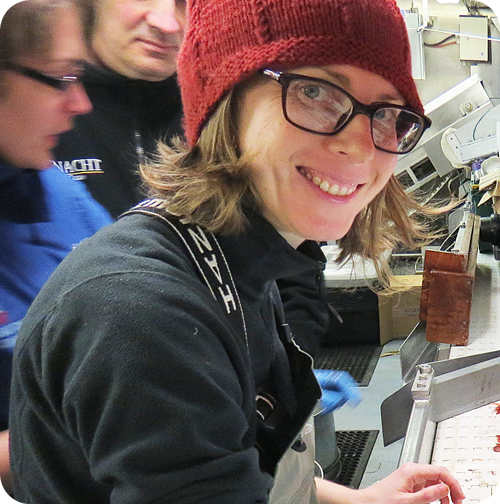You voted!

Candidate for President-Elect

Department of Evolution, Ecology, and Organismal Biology The Ohio State University
ludsin.1@osu.edu
www.ludsinlab.com
Dr. Stuart A. Ludsin currently is Professor in the Department of Evolution, Ecology, and Organismal Biology (EEOB) at The Ohio State University (OSU). He previously worked as a Fisheries Research Biologist with NOAA’s Great Lakes Environmental Research Laboratory (2002-2007) and as a Great Lakes Institute for Environmental Research Post-doctoral Fellow at the University of Windsor (2000-2002). He received his PhD in EEOB from OSU (2000), his M.S. in Fisheries from Auburn University (1994), and his B.S. in Zoology from Miami University (1992).
Generally, his research has sought to identify the mechanisms that regulate aquatic food webs and fisheries production in lake, estuarine, coastal ocean, coral reef, and inland reservoir ecosystems with a goal of applying this ecological understanding to resource management problems. As part of this effort, he has spent more than 25 years conducting early life stage investigations on exploited fish populations, with the goal of better understanding the recruitment process. His service activities have also been diverse and extensive. For example, he has served as an ad hoc reviewer and/or panelist for more than 15 extramural funding programs and ~30 journals, and as an Associate Editor for both Transactions of the American Fisheries Society and the Journal of Great Lakes Research. He has also been an active, appointed member of the Great Lakes Fishery Commission’s Board of Technical Experts (since 2007) and recently (2012-2015) served as an elected U.S. representative on the Board of Directors for the International Association for Great Lakes Research.
Dr. Ludsin looks forward to the potential opportunity to serve the Early Life History Section of the American Fisheries Society. Given his experiences working in both freshwater and marine ecosystems, he would seek to continue to bridge the divide that has existed between scientists conducting early life studies in both types of ecosystems. Continuing to narrow this divide would help identify similarities in early life processes (e.g., development, recruitment) that exist among fishes residing in both ecosystem types. Such knowledge would not only advance science but also potentially assist with efforts to keep our valued fisheries sustainable in the face of continued human-driven environmental change. As a member of the Executive Committee, I would also work to increase participation by underrepresented groups within the Early Life History Section, as well as student engagement within the Section by promoting new and useful learning opportunities for them.
My current role as Chair of my home department’s Diversity, Equity, and Inclusion Committee and experience teaching classes of value to both undergraduate and graduate students (e.g., manuscript and proposal writing courses) would help me facilitate these efforts.
Candidate for Secretary-Elect

Research Scientist
Northwest Atlantic Fisheries Centre, Fisheries and Oceans Canada
Hannah.Murphy@dfo-mpo.gc.ca
My contribution to early life history research is in the research fields of trophodynamics, fish larval ecology, and recruitment dynamics. The main finding of my PhD research was a positive relationship between fast larval growth and recruitment success that provided support for one of the main hypotheses in Fisheries Science: that larval survival is an important driver of recruitment variability. I also found that high densities of preferred prey were vital for larval survival, which emphasized the importance of trophodynamics in marine ecosystems.
My research program at the Northwest Atlantic Fisheries Centre (Fisheries and Oceans Canada) is on recruitment dynamics of forage fishes in Northwest Atlantic marine ecosystems. My research is used in the Canadian regional stock assessments for capelin and Atlantic herring. Recently, our research group developed a capelin forecast model that uses a 20-yr capelin larval time series as one of three data sources used in the model. This forecast model provides an explicit link between survival at the larval stage and recruitment. I am currently co-supervising two students (one MSc, one PhD). The MSc research project is on Atlantic herring as predator in the Newfoundland coastal ecosystem including its potential impact on recruitment dynamics of capelin, and the PhD candidate is researching the trophodynamics of capelin larvae.
I joined the Early Career Committee (ECC) of the ELH section of AFS in 2018 at the 42nd Annual Larval Fish conference in Victoria, BC. In the lead up to the 43rd Annual Larval Fish conference in Spain, I contributed to organization and development of the ECC activities. In addition to the ECC workshop, we launched a series of lightning speed talks. Both the workshop and speed talks were well received and had high engagement from the conference participants. At the larval fish conference in Spain, Alison Deary and Marta Moyano stepped down as leads of the ECC after a successful tenure. A new ECC was formed, and I remained on the committee along with Jessica Randall, Lysel Garavelli, Carolin Muller, Kelsey Swieca, and Michael Sswat. I was subsequently involved in the post-conference survey and writing two articles for the Scope (overview of the ECC activities at the 2019 conference and the results of the 2019 post-conference survey). We started planning the ECC’s activities for the 44th Annual Larval Fish Conference in Mystic, Connecticut in early 2020. We developed a workshop idea on how to give and receive constructive criticism and secured two researchers to lead the workshop (Drs. Ali Deary and Janet Duffy-Anderson). The topic for the lightning session was lessons learned in the field. However, when the scale of the COVID-19 pandemic became clear and international borders were closed, the decision was made to postpone the annual larval fish conference and have a Virtual Town Hall instead. The ECC collaborated closely with Hannes Baumann, the organizer of the 44th Annual Larval Fish conference, to help organize and moderate a panel discussion with three researchers on their experiences and advice on networking, especially during the pandemic. Virtual hang-outs were also organized after the panel discussion but encountered technological difficulties. Many participants of the virtual hang-outs met after the Virtual Town Hall, including myself. I was nominated to host a break out room and met with students a week after the town hall.
I would like to continue the strong collaboration between the ECC and the Executive Committee in organizing conference workshops and activities. I would like to serve as a mentor to other early career women in the ELH section. Mentorship opportunities may include organizing informal meetings at conferences or organizing group chats online to discuss topics such as strategies for job applications, choosing the right post-doc, developing leadership skills, and balancing research, publishing, and family life. I would like to encourage the continued growth of the ELH section by keeping conferences affordable, reasonable in size, and providing opportunities for participation for all members. I am invested in continuing to make the Larval Fish Conference the go-to conference for ELH researchers. The restrictions of COVID-19 has brought to the forefront the ability to host at least portions of conferences online, and this approach may be considered going forward as a means to encourage participation of as many members as possible.